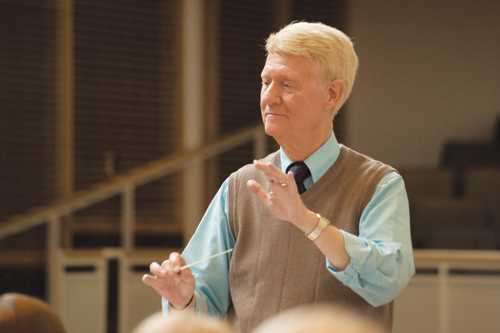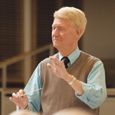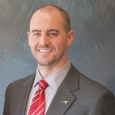
Thomas Trimborn was professor of music education at Truman State University (Kirksville, Missouri), until his retirement in 2014. He served as director of the graduate Master of Arts in Education program in music education, directed the Wind Symphony II ensemble, supervised student interns, and taught various undergraduate courses. He earned degrees from the University of Wisconsin-Milwaukee and Northwestern University serving as director of bands at Palatine (Illinois) High School (1968-1985), and also taught at Valparaiso University (1985-1992). He is a renowned scholar on Abraham Lincoln and a well-known artist, and his illustrations and articles have appeared in many publications. He was inducted into the Missouri Music Educators Association Hall of Fame in 2016.
During your tenure at Truman State University, how have the incoming music education students changed?
Our enrollment dramatically increased due to the quality of our performance groups. The solid reputation of the Master of Arts in Education also drew freshmen who had already decided to go into teaching. The program, rigorous both academically and musically, attracted students who were assured a great internship with the best mentor teacher available in the field. Early on, students questioned the need to earn two degrees, but the reputation of the University, the quality of those completing the new MAE program, and their placement in fine teaching positions upon graduation, turned that around within my first few years at Truman.
What knowledge do young music educators need now that was not necessary 20 or 30 years ago?
The easy answer is skill with technology. Because technology changes so rapidly, I feel that some hands-on knowledge can be picked up during the internship and later on the job. Trying to keep up with technology can shortchange the grounding in solid musicianship. I think becoming a good musician continues to be the most important requirement for anyone going into music education.
In addition, young educators have to think outside the box when establishing their music programs. They cannot go into the field to focus exclusively on performance, but also need to establish a comprehensive music program that includes composition, performance, improvisation, listening, AP theory, and even musicology. I used to talk in my university courses about the value of having a historian in my bands to gather information, photographs, and articles, and to write program notes; these are all skills of a musicologist. There are always students who will enjoy that type of work.
What changes or challenges do you see the profession facing over the next 20 years?
The challenges are probably the same as always. The public tends to view music education as expendable one minute and essential the next. Educators have to advocate for and explain what is being taught and learned. We assume people understand it, but I think we have to be more intentional about reminding everybody that the arts are essential to a high-quality and culturally complete education.
What are the best ways to explain what is being taught and advocate for music education?
Having taught for most of my career in public schools, I am a strong supporter of uniform access to a sequential, standards-based music education taught by instructors fully certified in music education in all schools – public, private (often made possible through vouchers), charter, and home schools. That said, teachers must tell their story and spend time doing so through public relations work. Speak at concerts explaining what students have learned about melody, rhythm, harmony, and form in terms the public can understand. Invite parents to rehearsals to witness the teaching and learning process. Reach out to perform for senior citizens. Inform your elected officials about your program and outstanding student accomplishments. Do not forget to use the media – print, web, radio, and television. Advocating for music and your program simply has to be part of the job.
What traits are the best predictors of success for future music educators?
I think great people skills and a certain charisma are essential. You do not have to be flamboyant necessarily, but you have to have the ability to draw people to you and communicate effectively. The best teachers want to make the world a better place and understand how music can touch the human spirit.
Are there ways to teach charisma to aspiring teachers who need more?
Charisma is something one can observe and try to emulate, but I am not sure it can be learned in a traditional sense. You know it when you see it. The teachers who exhibit charisma are attractive, caring, open and self-revealing, self-assured, comfortable and relaxed, joyful, and passionate about what they do. They are also truthful, disciplined, and goal oriented. Most importantly, they teach students music, not music to students.
What advice should high school teachers offer to students who want to pursue a music education degree?
Advise students to have as many experiences as possible outside of school. This might include giving lessons to students, studying piano, babysitting, playing in a drum corps, and singing in a church choir. Students should not rely on a single college program to gain and complete a musical education. It helps to be intentional and set varied activities and goals while still in high school. At the college level, we can do more to help students identified as likely to be future educators such as providing opportunities to come to campus for summer programs and to shadow professors.
With all of the state and NASM requirements, is it still realistic to complete an undergraduate degree in four years?
I think the four-year degree has been outmoded for many years, actually. I don’t know what the solution is, but we keep trying to shoehorn more content into four-year programs and something has to give. Currently, it is often going to take longer than four years for students to finish their degrees. Politicians want students to graduate in a timely fashion (four years), but added requirements and costs in most cases do not make this possible. I don’t know when this problem will be solved, but not soon, I fear.
What are your biggest concerns about music education?
Currently, the common core. In the field of music education, teachers are often expected to teach subjects other than music. Music, of course, relates to history, science, math, and language, but it happens through a musical lens. Music educators are music educators, period. I think we can and should reach out and cover other areas, but it has to occur through our musical lens. Also, I do not think future teachers are being sufficiently prepared to teach in rural schools with few students. For instance, when faced with a band of eight students, they are ill-prepared to envision anything other than the traditional large concert or huge marching band. This must change.
Why did you initially enter the field of music education?
I knew I had to make music the center of my life, and there is no better way to spend a day than to get up, go to school, spend time with great young people, make music, and get paid for doing it. I have always had a strong drive and work ethic, and some great early mentors provided inspiration starting when I was seven years old. It is powerful to learn from people who are doing something really important and appealing.
How have you changed as an educator over time?
My basic approach remains mostly the same but has deepened. I have a greater appreciation for the importance of music in people’s lives. I always took it seriously, but the more that time has gone on, the deeper that has become. I stayed motivated and taught for 45 years because I do not know what else I could have done that would have been so worthwhile.
If a new teacher asked for help in designing a curriculum and running a rehearsal, what would you suggest?
Design a program and curriculum that is comprehensive, including as diverse an experience as possible with multiple genres of music to hear and learn. Always teach from your strengths. If you don’t, it will show.
Rehearsals and classes must be planned in advance while being flexible enough to address problems that arise. Selection of appropriate music is the most important thing to get right for any teacher. Therefore, know the capabilities of your students as well as their potential for growth. Determine those things, and you have a recipe for success for everyone. As a high school band director, I chose and studied all of my concert music during the summer, so it was possible to lay out rehearsal plans for the entire academic year. I planned backwards by first determining the goal, and then the steps to reach that goal.
What are the most important lessons you learned as a high school director?
There is strength in numbers. Never pass up an opportunity to combine forces – band and choir – with the dance, drama, and art departments to stage a musical or show, to work alongside of colleagues as a team. Share everything, and give credit where it is due. I have worked with wonderful fellow faculty members for my entire career. Whether it is in an elementary, middle, high school, or university department, working to achieve strong supportive relationships with professional associates and groups is essential.
What do high school students most need to learn that they did not master in junior high and how did you teach it?
Rhythm, particularly understanding and. For whatever reason, students understand downbeats, but not subdivision. I had no magic formula, so I relied on old school methods to teach students how to count 1-&-2-& – writing up and down arrows in their music, foot tapping, and clapping. I incorporated rhythm drill into every rehearsal using the books available at the time – especially 101 Rhythmic Rest Patterns by Grover C. Yaus. It was all traditional but it did work.
What are your plans for retirement?
I hope to work with educators as a consultant and perhaps do in-service clinics. I also want to continue my passion for art, and present programs on Lincoln and the music of the Civil War and on Sousa’s life and career – a real passion of mine. I also hope to influence policymakers in Missouri to give greater financial rewards to the best public school teachers. That is where financial investment is needed. It is important to reward teachers for being great mentors to young people coming into the field. I would support full-year internships for future teachers, with stipends for mentors to cover the time to observe and properly evaluate interns. Teachers should receive funding for travel to conferences and visits to observe in other school districts.






